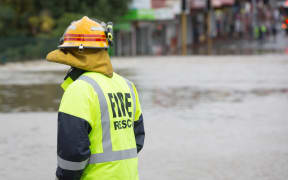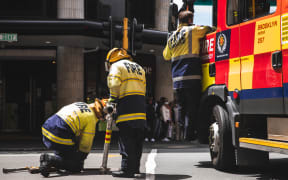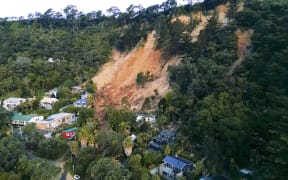
Flooding in Auckland on 9 May. Photo: RNZ / Finn Blackwell
New flood rescue teams that saved 32 Aucklanders in Cyclone Gabrielle and the Anniversary Day deluge, were pulled back in the face of incoming storms in May, and are in a dispute over pay, conditions and safety.
RNZ can reveal Auckland, Northland, Nelson and Whakatāne were without the extra water rescue help during widespread floods in May.
"Water response capability withdrawal," said an email to commanders on 4 May.
"I cannot supply you a team at this time."
The new teams that were primed to go in, did not, and expressed frustration. "Gutted," one said.
Fire and Emergency (FENZ) had rushed to set up a total of six flood rescue teams nationwide early in 2023 in a belated response to more extreme weather.
In its first test, three teams helped with multiple evacuations and 40 incidents in January and February around Auckland and Mangawhai.
But on 3 May, when floodwaters had already cut off small communities in Bay of Plenty - and with bad weather forecast from Northland to Tasman for several days ahead - FENZ told the flood teams it was changing their pay rates.
"Stand down return to normal duties," a water rescue advisor told the teams.
As a result, a team already in Kaikohe left and returned to Auckland.
A second Auckland team stood itself down.
The Christchurch team was pulled from going to Nelson.
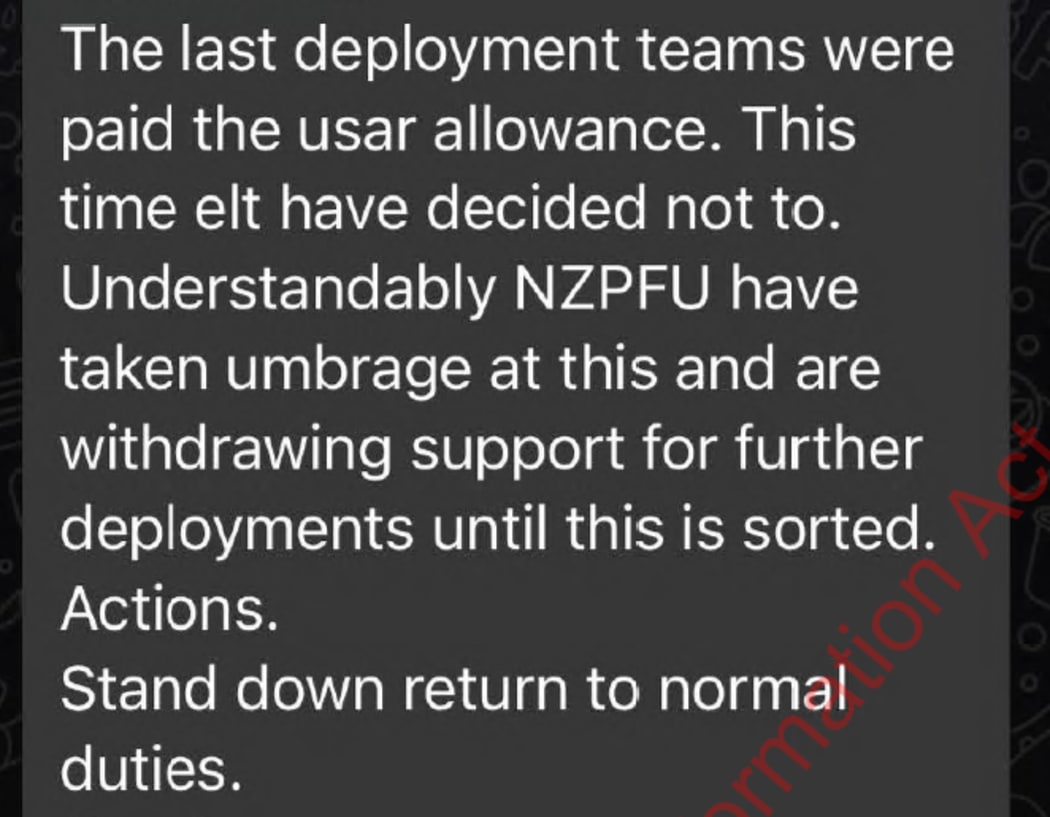
Screengrab Photo: Supplied
Whakatāne did not ultimately need the two teams it asked to be put on standby, but would not have got them if it had.
"Understandably NZPFU [the union] have taken umbrage at this and are withdrawing support for further deployments until this is sorted," the advisor said in SMS messages released to RNZ.
The extreme weather continued over large parts of the country for the next several days, as the teams sat, largely unused.
FENZ, with the storms already upon it, and having failed to sort out the pay earlier, had the choice to simply pay what it had in February, but chose not to.
On 9 May, one team - reactivated in an urgent stopgap arrangement - located the body of teenage schoolboy Karnin Petera in Abbey Caves. But even this deployment was characterised by delays, OIAs showed.
FENZ told RNZ on Friday it was "disappointing" the firefighters' union had pulled the plug.
However, the union said the agency's ad hoc approach to specialist deployments had gone on for too long, since at least 2019, and continues to question the teams' training and equipment - some have had to borrow their rafts.
"No one should have to worry about it," national secretary 'Wattie' Watson said.
Though FENZ said flood teams had gone out twice since May, and one was currently on standby, all on regular pay, the dispute is bubbling not far from the surface.
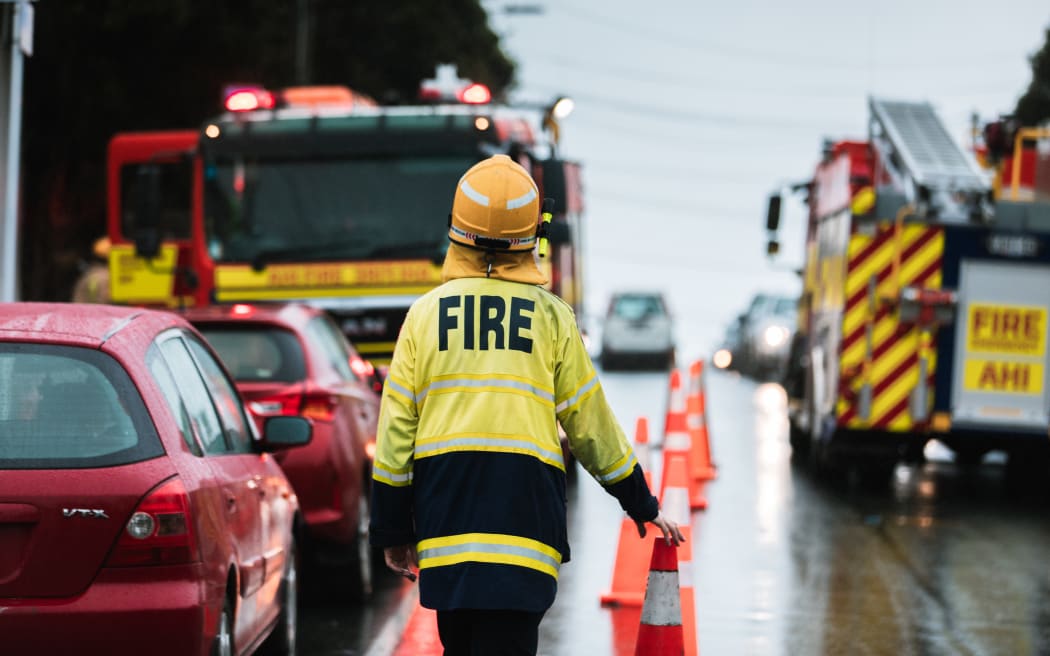
File photo. Photo: RNZ / Samuel Rillstone
'Gutted' - firefighter
More than 100 pages of emails and SMS messages released under the OIA show the newly-trained flood rescuers were eager in May to get out and help, but hit a wall.
"Oh bro ... I saw the email this morning ... Gutted," one team member messaged on May 4 about being told to stand down.
"Yea bit of a rug pull," a colleague responded.

Screengrab Photo: Supplied
Extraordinarily, the day before, on 3 May around 10am, as FENZ was being told some Bay of Plenty settlements were already cut off - "Taneatua is an island" - its leaders were still debating what to pay the teams.
"The national commander will come out with some advice shortly," an email at 1pm said.
When the teams were told two hours later that the rates would change, a debacle ensued, with the teams pulling out or standing down.
During Gabrielle they got paid a rate like Urban Search and Rescue USAR. In the May's floods, FENZ said it would be regular pay-plus-overtime (overtime can cost it more than the USAR rate depending on the hours), and told RNZ this was now the going rate.
That was news to Watson on Sunday night.
"In May, it came to a head," she said.
On Friday, she thought a deal had been done for a "universal" allowance in the interim covering flood rescue.
FENZ did not mention this in statements to RNZ. "We now need to go back to them," Watson said.
The situation appears to pose the risk of admin once again interfering, just when emergencies demand full attention.
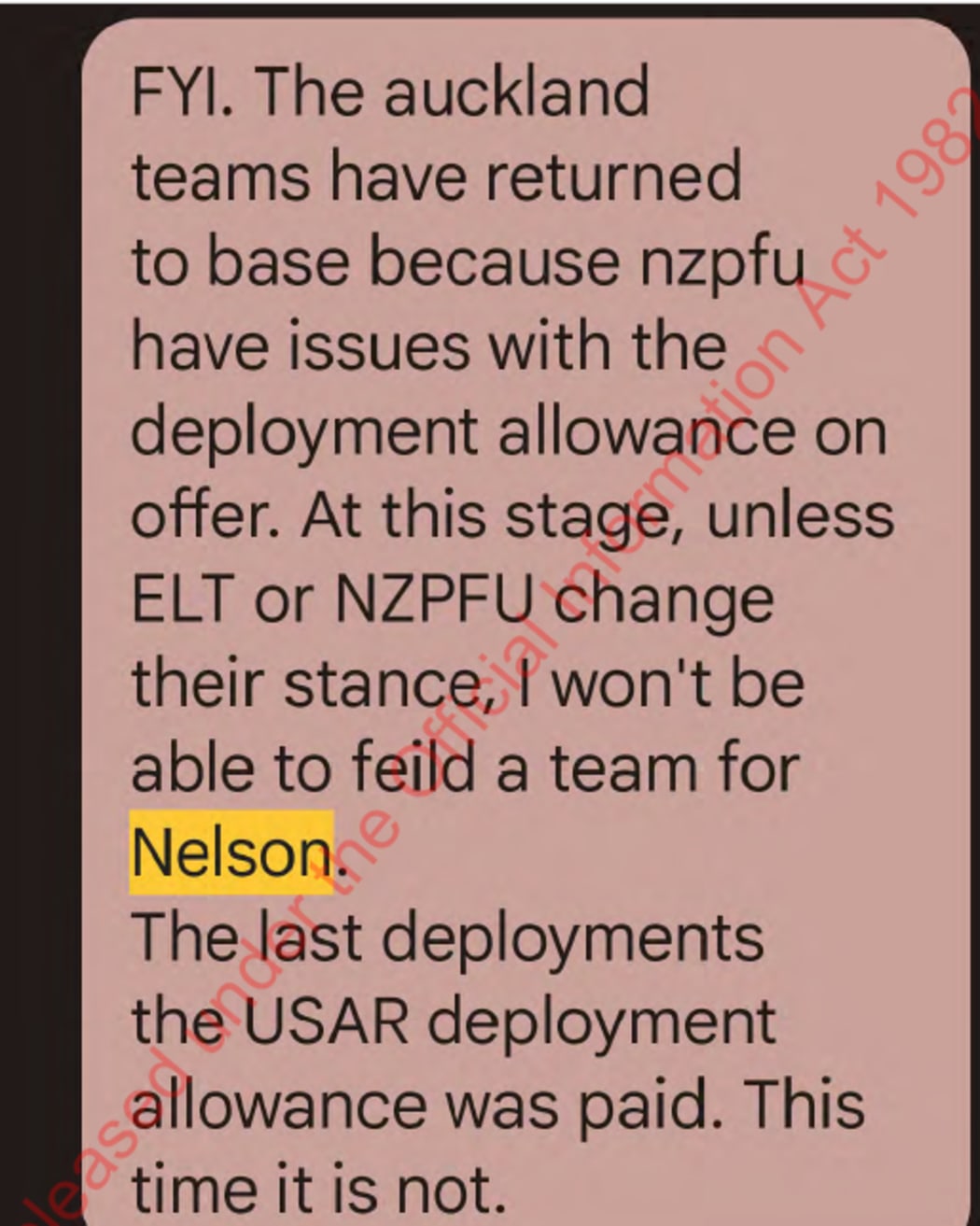
Screengrab Photo: Supplied
Back on 4 May 4, the national water rescue adviser Hamiora Taite tried to salvage things by suggesting a stopgap pay deal to national headquarters.
"The Auckland team will tip out at a moments notice if they get the green light," Taite told them. sic grammar
The interim deal would also let them get a team to Nelson in time for rains expected to hit on 5 or 6 May, he said.
"Fingers crossed common sense prevails," he told the teams.
But HQ told him it was a no-go.
"All those local agreements are problematic and causing confusion," deputy national commander Brendan Nally told Taite.
"Its not going to be tidied up I [sic] the short term - the pathway is a formal dispute meeting ..."
As the emails went back and forth, the storms were building and hitting various places.
Curiously, regarding Whakatāne, FENZ told RNZ on Friday that the area did not end up needing a flood team because "the bad weather forecast for the Bay of Plenty did not eventuate". Yet its own local commander and media reports said the opposite.
After some wrangling, Taite did manage to get an Auckland team to Whangārei on 9 May.
Four months on, the dispute has yet to be "tidied up".
FENZ, though, was putting the best frame on it at the weekend: "Our firefighters do an amazing job and we have confidence in their professionalism and in their commitment to serve their communities," deputy chief executive service delivery design Dr Steph Rotarangi said in a statement.
"Specialist water rescue team ... members are paid their associated hourly rate with overtime and allowances," she added.
An Auckland team was currently on standby to cover Northland on this basis, and two other river rescues in Canterbury in July and mid-September were on regular pay, she said.
But frustration remains evident among firefighters with specialist flood or USAR training, and not just about uncertain deployment conditions for teams away from home, on 24-hour call, in stressed emergencies.
The deployment problems went wider, symptomatic they believed of an agency that had not got itself sorted to respond either early or adequately enough, too often, during this year's storms.
"No vehicle, very minimal boat capacity," one member told RNZ in June about his flood rescue team.
Sources familiar with USAR said it struggled to get 4WD utes during Gabrielle. FENZ said utes were available but demand was high.
Before floods hit Northland and Abbey Caves, members of Auckland's flood rescue teams talked about the need to get up there early. "The weather looks like it will hit Nth hardest early Tuesday am [morning] we would have to be in Nthland Monday night [8 May]," they said in am SMS.
FENZ did not send them in early.
Instead, on 9 May, as it rained and the roads became hazardous, a call went out from police at the caves around 11am for the team's help. But it was still in Auckland. The members tried to get on a chopper, but none would fly due to the weather.
Eventually, they got there by road five hours later, and then worked quickly to locate the teenager's body, an OIA shows.
Had they been there earlier, they could not have saved the schoolboy but could have provided vital backup had it been needed - if the school group was still stuck in the cave, a source suggested.
"When they deploy late, it also affects the health and safety of firefighters," Watson said.
"They are wondering when they are going to be stood up, how they are going to get there, how they will be paid."
Regular fire crews and police were at the caves from early on.
FENZ said it would not comment on that with a WorkSafe investigation under way.

